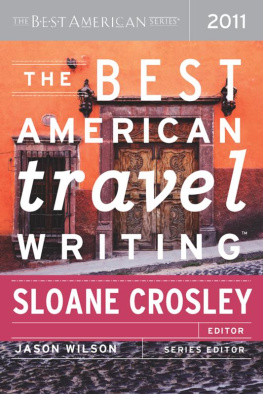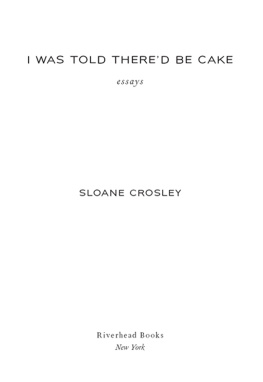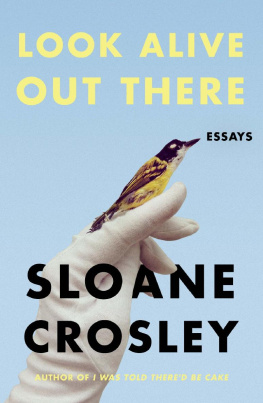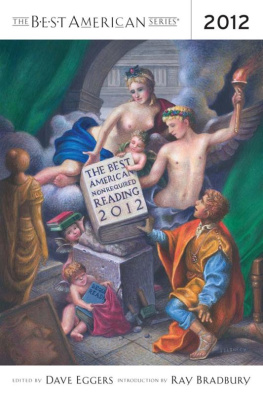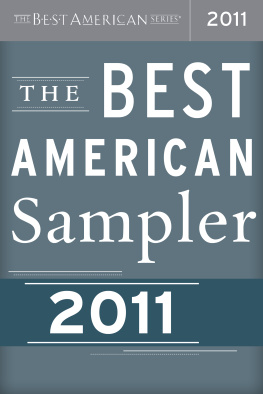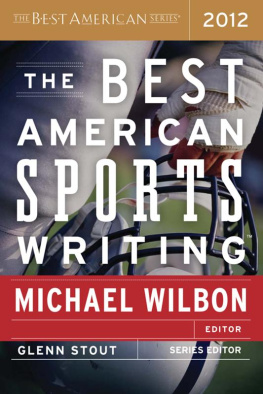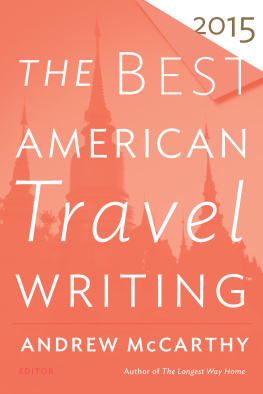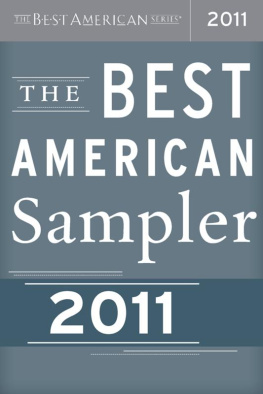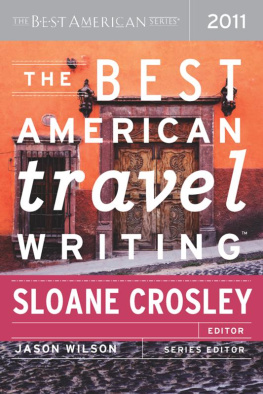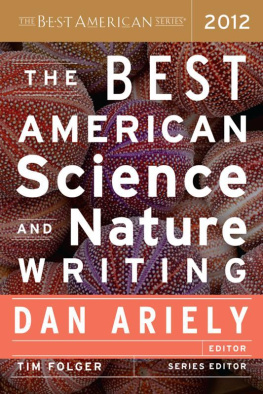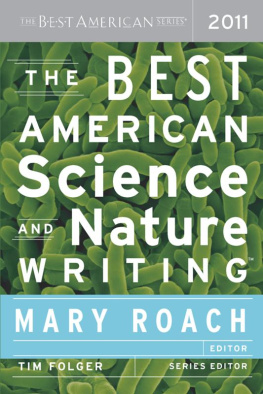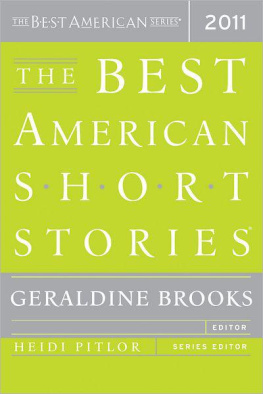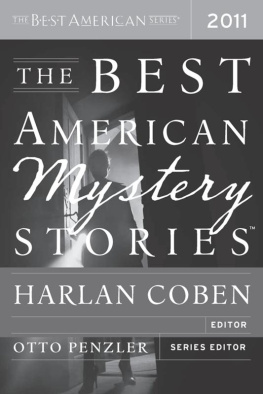Copyright 2011 by Houghton Mifflin Harcourt Publishing Company
Introduction copyright 2010 by Sloane Crosley
ALL RIGHTS RESERVED
The Best American Series is a registered trademark of Houghton Mifflin Harcourt
Publishing Company. The Best American Travel Writing is a trademark of Houghton
Mifflin Harcourt Publishing Company.
No part of this work may be reproduced or transmitted in any form or by any means,
electronic or mechanical, including photocopying and recording, or by any
information storage or retrieval system without the proper written permission of
the copyright owner unless such copying is expressly permitted by federal copyright
law. With the exception of nonprofit transcription in Braille, Houghton Mifflin
Harcourt is not authorized to grant permission for further uses of copyrighted
selections reprinted in this book without the permission of their owners. Permission
must be obtained from the individual copyright owners as identified herein. Address
requests for permission to make copies of Houghton Mifflin Harcourt material to
Permissions, Houghton Mifflin Harcourt Publishing Company, 215 Park Avenue
South, New York 10003.
www.hmhbooks.com
ISSN 1530-1516
ISBN 978-0-547-33336-6
"My Monet Moment" by Andr Aciman. First published in Cond Nast Traveler,
September 2010. Copyright 2010 by Andr Aciman. Reprinted by permission of
the author.
"Southern Culture on the Skids: Racetracks, Rebels and the Decline of NASCAR"
by Ben Austen. Copyright 2010 by Harper's Magazine. All rights reserved. Reproduced
from the October issue by special permission.
"The Coconut Salesman" by David Baez. First published in The New York Times
Magazine, June 25, 2010. Copyright 2010 by David Baez. Reprinted by permission
of David Baez.
"Venance Lafrance Is Not Dead" by Mischa Berlinski. First published in Men's
Journal, June/July 2010. Copyright Men's Journal LLC 2010. All rights reserved.
Reprinted by permission of Men's Journal LLC.
"My Year at Sea" by Christopher Buckley. First published in The Atlantic, December
2010. Copyright 2011 by Christopher Buckley. Reprinted by permission of
Christopher Buckley.
"A Girls' Guide to Saudi Arabia" by Maureen Dowd. First published in Vanity Fair,
August 2010. Copyright 2010 by Maureen Dowd. Reprinted by permission of the
author.
"The Last Stand of Free Town" by Porter Fox. First published in The Believer, June
2010. Copyright 2010 by Porter Fox. Reprinted by permission of Porter Fox.
"Stuck" by Keith Gessen. First published in The New Yorker, August 2, 2010. Copyright
2010 by Keith Gessen. Reprinted by permission of the author.
"Famous" by Tom Ireland. First published in The Missouri Review, Spring 2010.
Copyright 2011 by Tom Ireland. Reprinted by permission of Tom Ireland.
"The Vanishing Point" by Verlyn Klinkenborg. First published in The New York
Times Magazine, March 28, 2010. Copyright 2010 by Verlyn Klinkenborg. Re
printed by permission of The New York Times.
"Reservations" by Ariel Levy. First published in The New Yorker, December 13,
2010. Copyright 2010 by Ariel Levy. Reprinted by permission of The New
Yorker.
"Aligning the Internal Compass" by Jessica McCaughey. First published in Colo-
rado Review, Spring 2010. Copyright 2010 by Jessica McCaughey. Reprinted by
permission of Jessica McCaughey.
"The Last Inuit of Quebec" by Justin Nobel. First published in The Smart Set, Janu
ary 7, 2010. Copyright 2010 by Justin Nobel. Reprinted by permission of the au
thor. Excerpt from page 480, Volume 5, is from Handbook of North American Indians,
Volume 5: Arctic by William C. Sturtevant and David Damas, Smithsonian (National
Museum of Natural History).
"Twilight of the Vampires: Hunting the Real-Life Undead" by Ta Obreht. Copy
right 2010 by Harper's Magazine. All rights reserved. Reproduced from the No
vember issue by special permission.
"A Year of Birds" by Annie Proulx. First published in Harper's Magazine, December
2010. Reprinted with the permission of Scribner, a Division of Simon & Schuster,
Inc., from Bird Cloud: A Memoir by Annie Proulx. Copyright 2011 by Dead
Line, Ltd. All rights reserved.
"Moscow on the Med" by Gary Shteyngart. First published in Travel + Leisure,
March 2010. Copyright 2010 by Gary Shteyngart. Reprinted by permission of
Denise Shannon Literary Agency, Inc.
"A Head for the Emir: Travels in Iraqi Kurdistan" by William T. Vollmann. Copyright
2010 by Harper's Magazine. All rights reserved. Reproduced from the April
issue by special permission.
"Miami Party Boom" by Emily Witt. First published in N + 1, April 23, 2010.
Copyright 2010 by Emily Witt. Reprinted by permission of N + 1 and the author.
Foreword
Find a place. Write about it. It's the fundamental premise of all travel writingthe most basic of writing exercises, and yet arguably one of the most important. Unfortunately, many readers' introduction to travel writing begins and ends with guidebooks or service-oriented, what-to-see, what-to-do, how-much-will-it-cost articles. While these forms of writing are certainly useful and have their place, great travel writing aspires to be more than just rote information and a list of bed-and-breakfasts and restaurants. "When something human is recorded, good travel writing happens," writes Paul Theroux. Hopefully, you too will aspire to this maxim, and work to improve your powers of observation, description, and storytelling along the way.
This rather dogmatic passage is taken from the syllabus of the travel writing workshop that I teach each year at my university. As you might imagine, Travel Writing is a popular coursecompeting with Ballroom Dancing or Wine Tastingand it attracts a mix of undergraduates of various majors, some who've spent intense periods of study abroad, and others who rarely leave their neighborhood in Philadelphia.
Whether they've traveled widely or not, none of the students have read very much travel writing outside of perhaps a Lonely Planet guidebook. None of them usually have heard of Paul Theroux or Pico Iyer or Simon Winchester or Bill Bufordall of whom I make them read, sometimes to their chagrin. The students who may have heard of Eat Pray Love or Under the Tuscan Sun usually know them as movies rather than books, and only a handful nod in vague recognition when I mention On the Road.
Most students don't take my travel writing class, then, because of the writing or because they want to be Jack Kerouac; they take it because their first travels, alone and away from home and school, just may be the most visceral experiences of their young lives so far. Writing might be one way to make sense of it. College students, lest we forget, aren't all that far removed from the "What I Did on My Summer Vacation" essays of middle school.
As we gather around the seminar table with their essays, the study-abroad students are always the boldest, sharing (often with TMI) the very recent experiences they've just returned from (only weeks ago in some cases). These are often ribald tales of hostels and drinking and romantic trysts. Often enough, though, a flicker of insight or an eye-opening moment of reflection appears. I always encourage them to think about their youthful adventures with as much distance as possible, and to fit their personal stories into the context of the place. "Why are you telling me this story?" I ask them. "What makes this your trip and no one else's?" The best of my students have a winning voice, one that makes the whole class take notice. What I ask in class, then, are the same things I ask of the essays each year as I read for this anthology.
Next page
